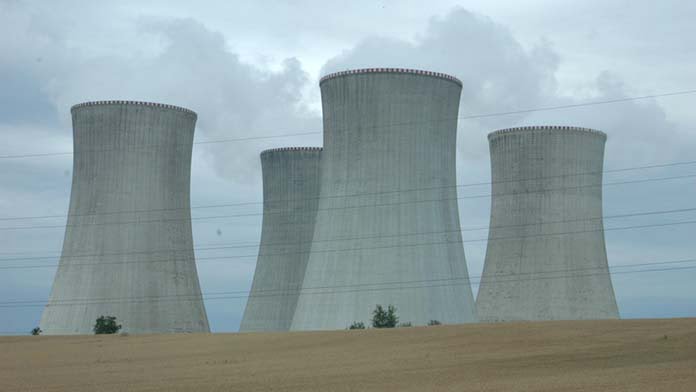Coalition leader Peter Dutton has attempted to breathe new life into nuclear power as a serious energy policy option.
He claims his idea to build seven nuclear plants around the country, the first of them by 2035, is the way to cut energy emissions and tackle climate change. But his real aim is to extend the use of coal and gas.
Despite his assertions, nuclear energy would cost far more than renewables, especially without any pre-existing nuclear energy industry in Australia. Remarkably, Dutton backs government investment and ownership of nuclear power plants to get them built.
Establishing nuclear energy plants by 2035 would be technically unprecedented not to mention the anti-nuclear state and federal legislation that would need to be overturned. Most experts say it’s impossible.
Dutton also claimed renewables are the source of wholesale electricity price increases and warnings of potential energy shortages. In reality, a mix of outages at ageing coal power stations and gas price increases caused by the Ukraine war, were to blame. The main reason for the concern over future energy shortages is the slowing in investment and construction of renewables.
Dutton’s pro-nuclear arguments are part of a broader attack on renewable energy and rejection of action on climate change. The facts are that renewables are cheaper, quicker, as reliable, and more carbon-efficient than nuclear power. Additionally, Dutton’s proposed modular nuclear reactor technology isn’t commercially available and would still produce radioactive waste.
However, it is Labor’s renewable failures and the AUKUS nuclear submarine deal that have allowed this ridiculous nuclear “debate” back into Australian politics. AUKUS, currently billed at $368 billion, is not only a waste of money but necessitates nuclear technology and workforce development in Australia.
Labor’s commitment to AUKUS has legitimised the nuclear industry generally, and includes agreement to store nuclear waste from US and British vessels here, making it more difficult for Labor to argue that nuclear power is unsafe.
The infrastructure for these submarines is already threatening to displace renewables projects. At Port Kembla, the space for a proposed offshore wind farm, which would be the biggest in the southern hemisphere, is threatened by a proposed submarine base. Union and community mobilisation has forced the government to reconsider.
Extending fossil fuels
The goal of Dutton’s pro-nuclear crusade is to defend fossil fuels. The timeline for building nuclear plants would require expanding gas fields and extending the life of existing coal plants. This is because even Dutton admits some of them wouldn’t come online until the 2040s.
Keeping coal plants operating would require government subsidies, as seen for the Eraring power station where the NSW state government is providing up to $225 million a year to keep it running.
Proving its contempt for climate action, the Coalition would scrap Australia’s 2030 emissions reduction target and withdraw from the Paris Agreement.
This is all a free kick for Labor to present itself as the only major party with a plan to tackle climate change, distracting attention from Labor’s ongoing criminal expansion of coal and gas projects.
Labor has committed under its “Future Gas Strategy” to continuing the approval of further gas projects. Last month saw federal approval of a new gas pipeline in Queensland meant to operate until 2064 and co-owned by Gina Rinehart.
The Victorian Labor government also approved the first new gas project since 2014, near Port Campbell on the Great Ocean Road. The NT Labor government gave environmental approval for a new fracking project in the Beetaloo Basin. Federal Environment Minister Tanya Plibersek could call in the project for another assessment, but has so far refused to do so.
Similarly, in the Pilliga/Narrabri where Santos is attempting to overturn Indigenous native title for new gas wells, Labor state and federal governments refuse to intervene, despite the power to do so. Meanwhile, Labor is delaying new federal environmental protection laws that would force climate change to be considered when approving mining projects.
The failure of Labor’s climate action plan is due to its reliance on private renewables investment, which has been slower than expected. Labor should use public investment and ownership of renewable energy to ensure it is built—instead of attacking the Liberals for proposing government ownership of energy.
The climate movement needs a strategic orientation towards winning workers and unions to fight for these demands.
This requires fighting for a “just transition”, demanding a state-funded renewables grid with guaranteed union jobs and retraining for fossil fuel workers as fast as possible.
It will take workers going on strike and people in the streets taking up demands for 100 per cent renewables and guaranteed green union jobs.
By Jack Stubley






